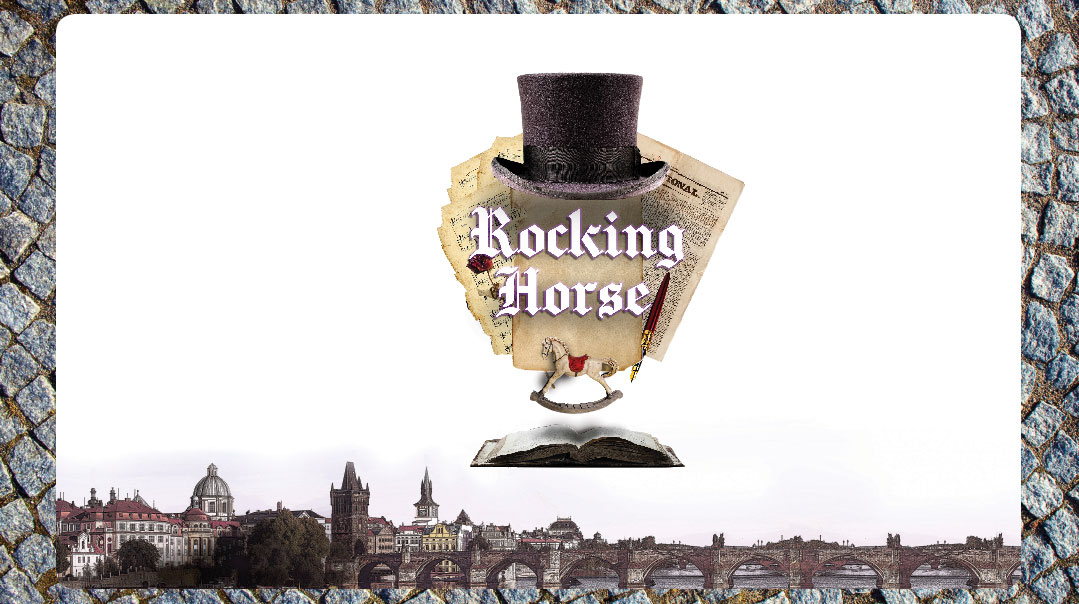Rocking Horse: Chapter 25

“Many are filled with anger, for that is the only force they find to sustain themselves”

The blue brocade gown is in her left hand. The small brown leather rectangle that is her forged passport is in his right hand. They both hesitate, waiting for the other to proffer their part of the deal.
Becca stares ahead, defiantly, determined not to give over the payment he required of her before she receives the precious goods. The room is already stuffy, though it’s early in the morning and still cool outside.
She looks around. The window is open, but is covered in thick blinds, to do some kind of hopeless battle with the sun. At her feet, one of the twins crawls towards them. The baby stops when it reaches her and tugs on the fabric of her dress. She can’t help but smile, even as she hopes the baby’s hands are not sticky.
Abu Khamir flips the passport back onto his desk, leans down and picks up the baby.
Suddenly tired, Becca lays the blue gown over a nearby chair. She reaches over to the desk and picks up the passport. Her fingers press against the leather. Finally.
She smiles. Her passport. She has a passport. She stands up straighter. Surely, she is taller. Surely, she has grown in the last few seconds, with this key back to Europe, to home. Her skirts will be unfashionably short, a whole inch above her ankle, and as soon as she gets back to Paris she will commission some more.
“They say that soon no one will need these.” Abu Khamir has a squint. He looks up at her quickly, as if it is immodest to do so, and then turns his attention back to the baby. “Passports will be abolished. All citizens of the great, wide world can travel as they wish.”
The baby pulls at his father’s beard, and instead of swatting away the little fingers, he catches them and blows lightly, so that the baby erupts into laughter.
“That will be bad for you,” she says.
He shrugs. “My artwork will always be in demand, for one certificate or another. Bad for you, though.”
She shakes her head, not understanding. What could be better than simply boarding a ship, heading home, without hindrance, without worrying about documentation? A free citizen of the world, as he said.
“There will be nothing to stop more of you coming. Jews. Jew girls.”
Fraydel’s golden hair. Raizel’s inquisitive eyes.
“There is work here. It is good for them to leave the dangers of Eastern Europe and find work, food, shelter.”
He tips back his head and laughs. Something makes her shiver inside.
“In Turkey, we praise the wind. Without it, how would we bear the blistering sun? The wind is a life flow through the world. This movement of people, it is also a wind. It blows great groups of hundreds and thousands around the planet so they find their destiny.”
She likes his poetry, but wants information. “And what is their destiny?”
He shrugs. “Like all of us, suffering.”
She stiffens. She did not come here to suffer. She came here to create change. If there is discomfort, loneliness, even fear along the way, so be it. They will come along as her fellow travelers, but she will not allow them to distract her from her destination.
He laughs again. “Ah, do not worry so much. Life is short. We will all die, soon enough. Remember, three days?”
Becca shakes her head. “I do not understand.”
“The words of Al-Basri: The world is three days’ duration. Yesterday has vanished, along with all that was in it. As for tomorrow, you may never see it. Today is yours, so work on it.”
The passport suddenly feels hot in her hands. Today. The words may come from a foreign place, but they hold the ring of truth. What is it that Felix says? Collige, virgo, rosas. Gather, girl, the roses. To adapt it, Collige, virgo, discipuli. Gather some disciples, dear Becca. Establish your school. Find some little girls to better.
The man is right. Fraidel and Rayzel and the other Jewish girls had the same obligation as her. Not just suffering, but achieving something.
As she steps through the front door and turns up the alley, she shakes her head slightly. Fraidel and Rayzel. She keeps trying to forget them, but somehow, they keep creeping back.
***
Felix pulls his mother’s old rocking chair into the living room and sets it by the fire. He looks at it critically. The back slats are wooden, and while it’s carved and cared for beautifully, it doesn’t look like the most comfortable of chairs. He turns to the ottoman, picks up a pillow, then a second, and arranges them against the back of the chair.
He has called in a favor for this interview. He grits his teeth as he thinks of it, a little boy who must run to Mama to make things right. And Mama, to his surprise, had agreed to talk it over with Chasya — not persuade, she had said, but point out that it may be in her benefit to have her story outside her, on a page, instead of deep in her heart. It seemed to be one of Mama’s new mantras, since the whole sanatorium business. Well, here it served him fine. He sits down on the rocking chair. Tolerably comfortable. The seat, too, needs padding. Why had he never noticed this when his mother sat on the chair? Why did she always sit on it lightly?
But then, his mother doesn’t sit too much, until the months when she did, and then she was so still that she was almost a part of the chair.
He goes to the linen storage, opens the chest, and takes out a brown woolen blanket. He folds it: halves, quarters, then eighths, and sets it carefully on the seat of the chair.
If she is coming, if she has agreed, surely she will speak. Wolf is waiting for this article. He had thought it would be delivered last week, and had left a space on page five. When the article did not materialize, Wolf had been forced to put in another advertisement. The carpenter whose services now took up page five would be happy — he had only paid for one advertisement, and received a second one without asking. If Felix doesn’t get this article written, he’ll never get out of writing masterpieces such as Hans and Bertha Prepare for Chanukah.
He sits down. Comfortable, if you like that sort of thing. A bit like being wrapped in wool. He brings the leg rest and puts it at a comfortable distance. Now. Perfect. All she will need is a cup of tea. She can tell her story like she is sitting in a cloud.
As he clatters around the kitchen, Emmy appears. She takes in the arrangements and smirks. “This woman, this new friend of Mama, she’s telling you her story, correct?”
“Correct.”
“For the newspaper.”
“Correct.”
Emmy folds her arms in front of her and gives a long stare. “I see that you fancy yourself as a nominee for best newspaperman. Or perhaps this will be your chance to win an award for the best article.”
He tries to keep his voice nonchalant. “I would not refuse it.”
When Chasya finally arrives, he ushers her to the chair and shepherds Leibe’le into Emmy’s care. When he had brought it up, Emmy hadn’t wanted to spend an hour or two playing with the child, but Papa had intervened.
“Have some family feeling, Emmeline,” he had said, peering over his glasses at her. Emmy had hung her head and agreed. He hopes that the boy won’t be bored. He hopes that Emmy won’t be resentful.
Chasya sits down, rocks for a little, and then eases herself up out of the chair. She surveys the setup.
“Thank you for your efforts,” she says, “but I would prefer to tell my story in my own way. I’m no grandmother who sits by the fire.”
“But your condition — ”
“I am aware of my condition.” Sharp words, but the smallest smile, or maybe it’s an inflection in her voice, softens them.
She tells her story like a tiger in a cage, pacing back and forth, prowling, a silent presence — you could barely hear her move beyond the slightest rustle of her skirts. One moment she stares out of the window looking onto the street. The next she is by the kitchen, or rearranging the cushions on the ottoman, or staring, brooding into the fire.
As he listens, he is drawn into a place that is so far away, yet is strangely familiar. His mother’s stories, he realizes. They are also about forests and woodcutters.
He blinks, jolts back into her story. Not a woodcutter. A timber merchant. His Yiddish still has what to be desired. But she is learning some German, too, and sprinkles in a few words when she thinks he wouldn’t understand.
My grandfather, she said, was once told to go into the woods for an hour a day, to talk to the Eibeshter. G-d, she hastily adds.
“For a timber merchant, that was just what he wanted to hear. That he could spend all day pursuing his interests and justify it by saying he was involved in prayer. So my grandmother would say.”
He starts. She is cynical. Unexpected.
She gives a half smile. “But that is unfair. My Zeide said that one of the good things about his work was that he could cry to G-d all day long if he wanted. He just needed to take a step or two away from his workers and he was in seclusion. Secluded. Solitary, but not alone.”
“And your father?” All stories, it seems, start with the father.
“My father was not so fortunate. My Zeide’s tools were taken by the government. His capital was confiscated. My father used to call himself a wolf-man, for all he did was lollop through the countryside, looking for supplies to get through the winter. He was no better than an animal, he would sigh.
“He would lug home firewood, only to have some goy knock on the door with a knife, to steal it away. There was no one to complain to, no justice. Just a good lock on the door and a longer knife. Though if you tried to use it, that was it, death to you, death to your family, death to the whole community. No one would dare unless he was driven out of his mind from starvation and cold and want.”
He tries to imagine it. The degradation. Who would he be without his neat and fashionable clothing, his learning, the knowledge that he can walk anywhere in the city and be treated with respect?
Chasya pulls her shawl tighter around herself. “When you are helpless, and without rights, when you work for sixteen hours a day and still watch your wife and your children fade away from lack of food — a slow and ongoing torture — you try and you try and you try. And many are filled with anger, for that is the only force they find to sustain themselves.”
Felix scribbles down: They must find some force that will sustain them. He looks up from his notepad. “But you have faith.”
She laughs, short and bitter. “Of course we have faith. It is the only thing not bought with kopeks.”
(Originally featured in Family First, Issue 694)
Oops! We could not locate your form.

